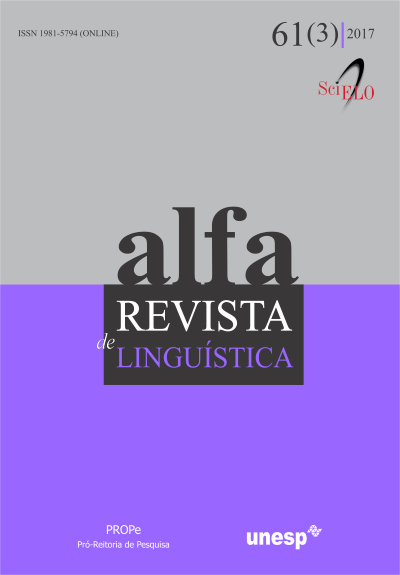Journalistic discourse and the supposed impartiality: the modes of appropriation of the discourse of others as indicative of ideological positions
DOI:
https://doi.org/10.1590/1981-5794-1711-3Keywords:
Journalistic discourse, Appropriation of the discourse of Others, Socio-ideological positions,Abstract
By joining the ongoing discussion of the area of journalism theory about objectivity and subjectivity and by discussing from the place of language, in this paper, we argue that the modes of appropriation of the discourse of Others can be the means to resolve that impasse, because we hypothesize that they show socio-ideological positions of the subject (journalist) in relation to the object of utterance. Thus, based on the conception of language developed by the so-called Bakhtin Circle, we selected some news from the two most widely read newspaper in the state of Pernambuco, namely, Diário de Pernambuco and Jornal do Commercio, related to Eduardo Campos, who was a presidential candidate of Brazil in 2014. The analysis showed that the modes of appropriation of the discourse of Others can be used to produce different effects of sense and, when the appropriation of the discourse of Others occurs, the subject-journalist does not yield place to the other, but rather speaks with him, showing ideological positions through the news.Downloads
Download data is not yet available.
Downloads
Published
19/12/2017
How to Cite
SANTOS, A. C. dos; RODRIGUES, S. G. C. Journalistic discourse and the supposed impartiality: the modes of appropriation of the discourse of others as indicative of ideological positions. ALFA: Revista de Linguística, São Paulo, v. 61, n. 3, 2017. DOI: 10.1590/1981-5794-1711-3. Disponível em: https://periodicos.fclar.unesp.br/alfa/article/view/8688. Acesso em: 28 feb. 2026.
Issue
Section
Papers
License
Manuscripts accepted for publication and published are property of Alfa: Revista de Linguística. It is forbidden the full or partial submission of the manuscript to any other journal. Authors are solely responsible for the article's content. Translation into another language without written permission from the Editor advised by the Editorial Board is prohibited.

